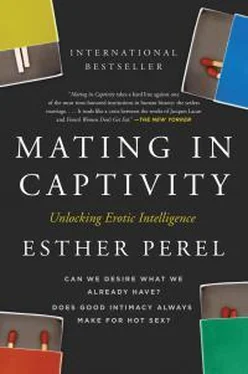“When he comes on to me forcefully, it makes me feel sexy. It heightens the tension. Like he wants me so much he just can’t help himself,” Elizabeth says. Vito, quick to respond, adds, “She can’t help herself, either. When she gives in, I know I’m irresistible.”
The harsh realities of violence, rape, sexual trafficking, child pornography, and hate crimes require that we keep a tight rein on the abuses of power that pervade the politics of sex. The poetics of sex, however, are often politically incorrect, thriving on power plays, role reversals, unfair advantages, imperious demands, seductive manipulations, and subtle cruelties. American men and women, shaped by the feminist movement and its egalitarian ideals, often find themselves challenged by these contradictions. We fear that playing with power imbalances in the sexual arena, even in a consensual relationship between mature adults, risks overthrowing the respect that is essential to human relationships.
By no means am I calling for a reversal of history or an antifeminist agenda. Any discussion of modern-day couples and sexuality would be perversely wrongheaded if it did not recognize the enormous and vastly salutary influence of feminism on the shape of American family life. The women’s movement sought to eliminate deep-rooted gender inequalities and to unearth the structures that perpetuated male domination in all spheres of life, including sexuality. It challenged the double standard that encouraged sexual experimentation by men, even seeing it as a necessary developmental stage, but forbade that same curiosity in women. This same double standard demanded sexual loyalty from women, while turning a blind eye on roaming men because “That’s how men are.” (There are still countries today where a man can murder his unfaithful wife with no legal repercussions whatsoever. In some cultures, killing her is the only way to restore his honor and that of his family.)
Gender differences and their ensuing taboos and prohibitions had long been viewed as categorical imperatives, biologically rooted and therefore immutable. Feminism showed that these undisputed truisms and characterizations were, in fact, social constructions that reinforced a long-standing gender ordering—one that obviously favored men. Books like Our Bodies, Ourselves and The Women’s Room aimed to restore a sense of sexual ownership to women, both legally and psychologically, and to free them from the constraints that had governed female sexuality. Female sexual pleasure could not be set free until women were relatively safe from the traditional and very real dangers associated with sex. Sexually transmitted diseases, rape, and unwanted pregnancy brought not only shame but also ruination, and childbirth always carried the threat of fatality.
Early feminists were much more interested in the subject of sexual sovereignty than in the subject of pleasure. First things first, they thought. As long as men completely dominate business and political life, as long as women are economically dependent on men, as long as the burden of child care falls wholly on women’s shoulders (toppling even the most egalitarian couples), you cannot speak of a liberated female sexuality. Undeniably, American feminists achieved momentous improvements in all these aspects of women’s lives; and no real freedom, sexual or other, is conceivable without them.
But these improvements also smuggled in some unintended consequences. Without denigrating those historically significant achievements, I do believe that the emphasis on egalitarian and respectful sex—purged of any expressions of power, aggression, and transgression—is antithetical to erotic desire for men and women alike.
The Bounded Space of Eroticism
Elizabeth and Vito have worked hard to have an equitable marriage, but sex takes them to another place. The power differential that would be unacceptable in her emotional relationship with Vito is precisely what excites Elizabeth erotically. At first, when she discloses her sexual predilection, she is embarrassed. It doesn’t fit her image of herself as a liberated, powerful woman. “I’ve struggled to accept what turns me on. For a long time I was disturbed by my fantasies. Submission just isn’t me. It took me years to reconcile what arouses me with my political beliefs. Somewhere in the midst of marriage, kids, and career, I realized that it was time to stop hiding, to stop pretending, and most of all to stop apologizing for who I was and what I hungered for in the world. Getting older helps. I don’t feel as if I have to justify myself. Maybe that’s the meaning of sexual liberation.”
A lot of women find their desire for sexual submission hard to accept. But stepping out of ourselves is exactly what eroticism allows us to do. In eros, we trample on cultural restrictions; the prohibitions we so vigorously uphold in the light are often the ones we enjoy transgressing in the dark. It’s an alternative space where we can safely experience our taboos. The erotic imagination has the force to override reason, convention, and social barriers.
The more I point to the tensions in these epiphanies of pleasure, the more relieved Elizabeth seems. I continue, “Of course nothing is scarier than a true loss of control in ‘reality.’ But the point of fantasy is that it allows you to transcend the moral and psychological constraints of your everyday life.” In the liberating expression of sexuality we give in to our unruly impulses and the disavowed, lurid parts of ourselves. Mordechai Gafni, a scholar of Jewish mysticism, explains that fantasies are like mirrors. We hold them in front of us in order to see what is behind. We spot images of ourselves that are otherwise inaccessible. If commitment requires a trade-off of freedom for security, then eroticism is the gateway back to freedom. In the broad expansiveness of our imagination we uncover the freedom that allows us to tolerate the confines of reality.
The very dynamics of power and control that can be challenging in an emotional relationship can, when eroticized, become highly desirable. In the crucible of the erotic mind, we bring the more vexing components of love—dependency, surrender, jealousy, aggression, even hostility—and transform them into powerful sources of excitement. My patient Oscar can’t stand being told what to do by his bossy wife, yet he enjoys being tossed around by her sexually. When she barks orders about the dishes, the experience takes him back to his mom’s kitchen. But he does not feel this regressive threat once the lights have been turned off. What he loathes in the domestic sphere becomes his choice in the erotic. Maxwell, who keeps a shrewd eye on his beautiful girlfriend’s many admirers, repeatedly brings them up when he makes love to her. What threatens in public becomes enchantment in private. He parlays his daily fears into nightly seductions. And Elizabeth, the take-charge woman, loves to get a break when Vito takes over sexually. She does not experience his control as oppressive. On the contrary, she feels taken care of. And she feels a renewed respect for him when, “For a change, he knows what to do.” His control offers her a safe container in which she can release her lusty self. The imbalance of power is both safe and sexy—at once protective and liberating.
Subverting Power
Some would say that Elizabeth’s desire for submission is nothing more than a reenactment of traditional male domination. They would claim that sexual arrangements in which one partner is dominant and controlling, the other passive and weak, are inherently hierarchical and oppressive, nothing more than a sexist replay of patriarchy. But prisoners rarely have the desire to pretend they are prisoners. Only the free can choose to make believe. To my thinking, being able to play with roles goes some way toward indicating that you’re no longer controlled by them. Play has the potential to disrupt the very notion of gender categorization. For Elizabeth, being controlled sexually is itself a subversive act that is ultimately liberating. The same is true for Marcus, who heads the research and development unit of a large international software company. He is a classic type A man: competitive, ambitious, spending more time in the air than on the ground. His tough-mindedness and aggressiveness have made him a natural leader in his highly competitive field. The word “power” is attached to many of his activities and often turns up in his conversation. He takes power walks, drinks power drinks, does power lunches, and recharges during ten-minute power naps. And in his free time, he likes a good spanking.
Читать дальше










